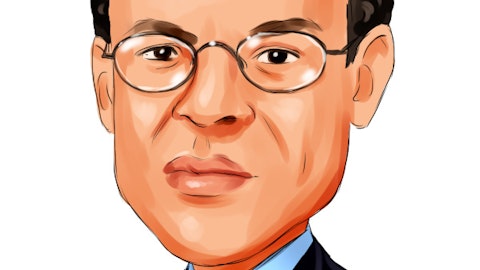Tyson Bauer: And foreseeable future, if we get through and we play a little catch-up, as you just mentioned, and we start kind of getting a more stabilized flow as long as component supply is there, does that imply by the end of Q1 of the next fiscal year you should be in a more comfortable position on where you’re at to make that decision? I mean, is foreseeable future one, two quarters or is it ‘don’t expect anything for the next fiscal year’?
Rob Capps: I said I don’t know at this point. That’s what we’re trying to understand. So, I can’t give you more guidance than we have here.
Tyson Bauer: Okay. The pending contract structure, obviously you’re not going to name who and it probably doesn’t make that big of a difference. Are those more for components, whole systems that you are going to be supplying, which obviously is going to be far more lumpy? And does that imply that they’re operating as kind of a middleman as opposed to the end user, which is typically your customer?
Rob Capps: They’re for full systems. They are the end user. And there is a production schedule that we’re working out with them over the next several quarters.
Tyson Bauer: Okay. So, when we see orders from them, these are going to be for whole systems. So, we’re looking at the $1.5 million all the way up to $4 million type systems that they would be purchasing at a time?
Rob Capps: Correct. Maybe even some smaller systems as well. But yes, the answer is yes.
Tyson Bauer: Okay. And is this a multi-year agreement?
Rob Capps: It is.
Tyson Bauer: Is there an accordion-type feature to this where you’ve set the price and it’s just a function of that price will be good for what they need going forward?
Rob Capps: No, no, no. And no — but I don’t want to get into specifics for some committed reasons as you might imagine.
Tyson Bauer: Okay. But we should see before the end of the year some more details and color come from this contract that will make it clear and obvious to the rest of us, the scope of it?
Rob Capps: I usually will. I think I’m very confident about that.
Tyson Bauer: Okay. All right. I mean, for right now, I’m sure Ross is in queue. We’ll let him take over. But it looks like, at least operationally, you’re where you want to be. It’s just what are we going to do on the decision on that accumulated deficit on the preferred and what’s it going to take to actually catch-up business-wise to basically create that residual value for the common once we satisfy the preferred side. So, hopefully, we’ll know that in a quarter or two.
Rob Capps: Okay.
Operator: Thank you. Our next question comes from the line of Ross Taylor with ARS Investment Partners. Please proceed with your question.
Ross Taylor: Well, Tyson was right.
Rob Capps: Don’t tell him that.
Ross Taylor: Yeah, well, he knows it now. You and I have had a number of conversations about the imperative nature of paying this dividend because there is no way you can — I mean, the equity is a residual here. And for those of us who own equity, for — we want and need you to get this preferred out of the way so we can start to accumulate the value that is going to grow in this company. And it strikes me as — a couple questions first. What was the inventory, working capital impact or drag last quarter from the deferred sales? Obviously, you were building stuff. You had costs that you incurred that didn’t go out the door as sales to generate revenue. So, what kind of impact was that?
Rob Capps: Our inventories over the last six months are up about $3 million roughly.
Ross Taylor: Okay. So, as you sell that out, we should start to see that cash flow should come in?
Rob Capps: Yes. But understand we’re going to continue building…
Ross Taylor: Yes, I understand. As you build backlogs and accounts receivable, you and I talked about the fact that you can actually do other steps, factor accounts receivable, things of that nature, that the cheapest debt you’re really going to get is the preferred, but it also absorbs. Right now that preferred probably has about $46 million worth of value. Your equity has about $8 million worth of value. It strikes me as I said before that if I want my equity to grow, you got to solve the problem with the preferred and it’s got to be imperative. And one of the things that you guys do is you keep promising us it’s going to work as a company and then just when you get back on the road, it’s like, if you didn’t think you could pay the fourth quarter dividend, why would you pay the third?
Save the money and pay it in the fourth, so you can start a string of winning. I’m starting to think you guys are managed by the same people who manage the Seattle Mariners, which is being from Seattle, not a compliment. But I think that — I mean, I’m wrestling with what your thinking is because I’m hearing you say we worry about this, but in fact, you have a lot of other alternatives to finance. You — quite honestly, if I were sitting on your Board, I would say if I vote against the dividend, the only other question is, I hire a banker for, A, to short the company, or B, to give it to Tyson to do an ATM and raise $5 million, because by my calculations, if you could buy back, say 500,000 shares for $5 million, you actually create $3.33 a share, an extra value for the common stock, which is basically a better than 50% increase over what it went out at.
It just strikes me as we really need to get focused on being a public company and developing the confidence of the Street. As I said, every time it seems like you’re about to turn that corner, you go into another dark place. How do we keep from being there? And answering Tyson’s question of you don’t know, I understand you don’t know, but you’ve got to have a plan and that plan’s got to be using these — you and I talked about other ways of raising capital and using these other ways because I think that you want to actually be able to eventually use that preferred dividend or preferred as a way to raise capital. It’s a better way than going into the general financing market, I would think. Am I wrong?




